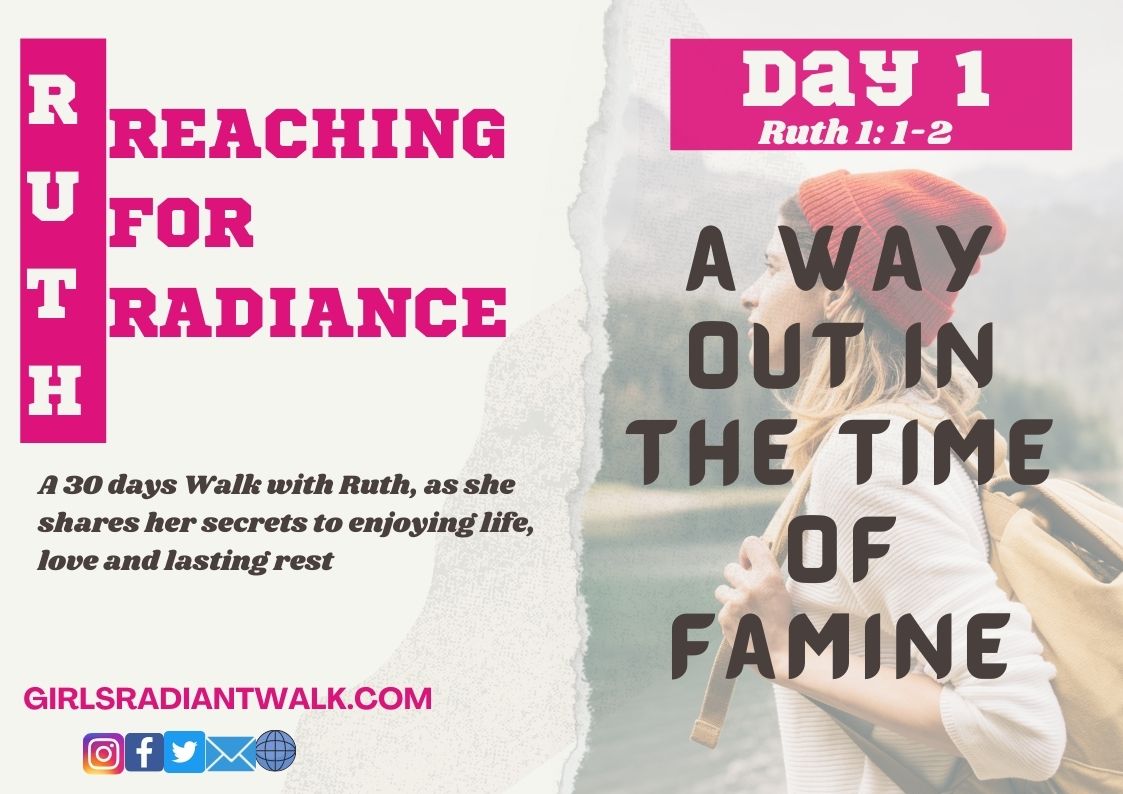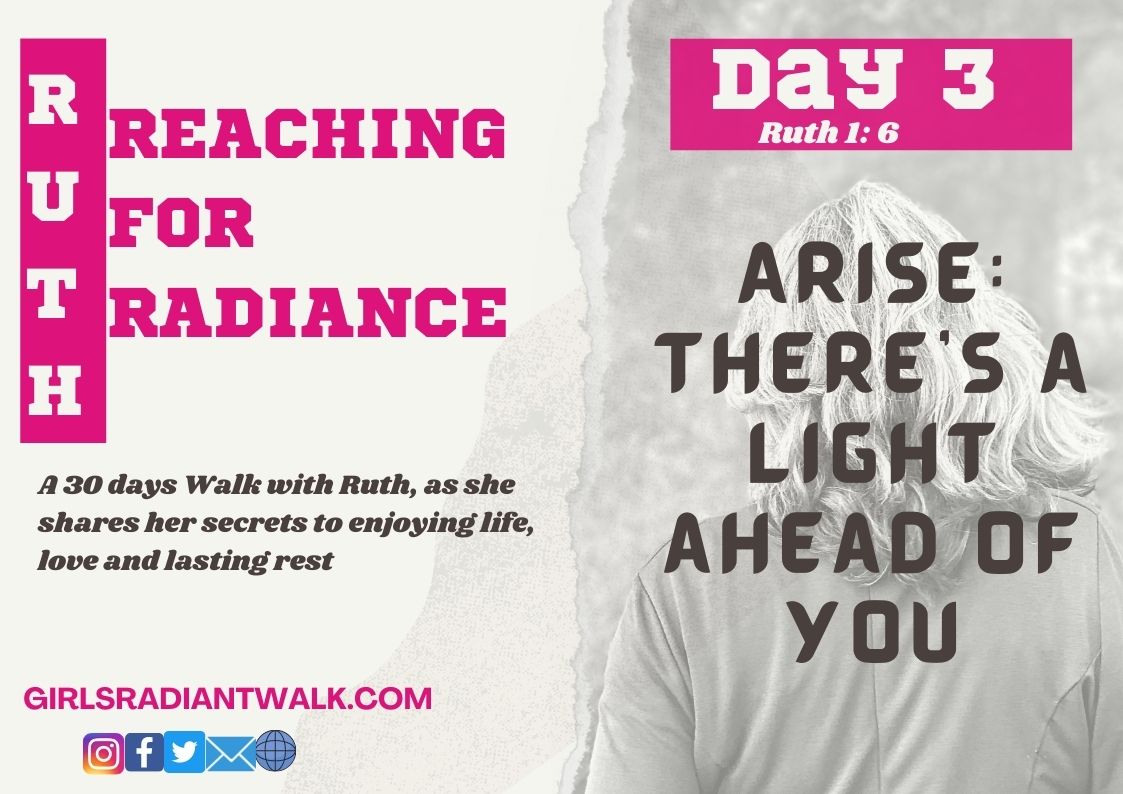Have you ever experienced a famine-like situation in your life? When every corner of your existence feels dry and empty, and you’re left craving for something to fill the void? I’ve been there too, and let me tell you, it’s not an easy place to be.
You’re not starved of physical food.
But your soul is starved. An emptiness. Depression, fear, loneliness, confusion, failure, disappointment, afflictions, sicknesses, shame, pain, hurt, betrayal…
All these and more can rip your soul of life… leaving you dry and empty. In need of something to fill you up.
Or is it in your spiritual life? Does God seem so far away? Your prayers and desires… like God isn’t hearing… or answers far away?
I’ve shared some of those famine-like experiences. And they’re not palatable – at all! So when I read this first sentence in the book of Ruth, I could understand their plight.
Famine. Hunger. A deep craving. Yet nothing to fill it with.
What do you do at such a time?
Sit, cry, complain… and run off to someone, something or somewhere to find a solution? Or look up to the hills from whence cometh our help…
Many times, we slide into the first option. I’m guilty of this. I remember days I feel overwhelmed. I just walk into a room, shut myself in and cry… weep. Losing the urge to draw close to God and weep at his feet. (You know they’re different things: to just cry to yourself or to get on your knees and cry in prayer to God.)
Other times, I turn to sweet food – just look for snacks and drinks to take. Or I pick a book and read – to distract myself. Or I lie on my bed and beg for sleep to sweep me away. Or I walk away to look for a place to go and hide out for a while.
How about you? What do you do at such distressing times?
Same as some of mine? You watch a movie? You call or rush to your friends and talk out everything on your mind. Or you slip into the arms of that young man, who’s been seeking a romantic relationship with you. And you seem to get some comfort and love in his arms.
In today’s blog post, we dive deep into the captivating story of Ruth and explore how her journey can resonate with our own experiences of famine. Whether it’s a physical need, a soul-crushing emptiness, or a spiritual distance from God, we can find solace, guidance, and even hope in the most challenging of times.
Let’s take a moment to reflect on the opening lines of the book of Ruth:
Now it came to pass in the days when the judges ruled, that there was a famine in the land. And a certain man of Bethlehem-judah went to sojourn in the country of Moab, he, and his two sons.
And the name of the man was Elimelech, and the name of his wife Naomi, and the name of his two sons Mahlon and Chilion, Ephrathites of Bethlehem Judah. And they came into the country of Moab, and continued there.
Ruth 1: 1-2
This family in our passage chose the first option, too. The Bible didn’t record their crying and whining, but we can imagine their actions before Elimelech finally decided – let’s pick our bags and leave this land temporarily. Yes, that’s what he thought.
Let’s just go sojourn somewhere else – in Moab. So, he went with his wife and two sons.
Elimelech wasn’t even the first in history to sojourn because of the famine.
Abraham did.
“And there was a famine in the land: and Abram went down into Egypt to sojourn there; for the famine was grievous in the land.” (Gen 12: 10)
Three things were similar in these sojourning of Elimelech and Abraham
a) They didn’t seek God’s opinion:
We didn’t read where either of them asked God what they should do at this time. We didn’t see them cry to God, like Moses did when they experienced hunger in the wilderness.
They didn’t ask God which step to take… Should I move to another land in search of food? If yes, where? They simply took laws into their own hands and took off. Oh, how many times we’ve made decisions without consulting God. Without His direction and approval.
b) They journeyed into a sinful land:
When you walk away from God’s plan, you’re bound to land in a sinful state. Disobedience. Idolatry (trusting in other things/people rather than God. Murmuring and complaining. Fear instead of faith. Worldliness. Immorality.
These are different lands people arrive at when they look for a solution without God. For Elimelech and his family, it was Moab. (We’ll discuss why Moab was a No-No for them.)
For Abraham, it was Egypt. Which sinful land do you find yourself in now?
c) They lost (or almost) something while away:
As we study down Ruth 1, we’ll see how Elimelech and his two sons died in this strange land. They thought the hunger in Bethlehem-Judah would kill them.
But they now walked into death with their own legs… in a place where they thought they’d find life. That’s why the bible says that he that seeks to save his life will lose it.
If you think sin, and worldly pursuits will fetch you life, you’re mistaken. You’ll lose that life – soon. When you least expect. How about Abraham? He almost lost his wife to the Pharaoh of Egypt. Sarai, his wife, was a fair – beautiful – woman. And because Abram feared they will kill him and snatch his wife, he old Saria to “Say I pray thee, thou art my sister…” (Genesis 12: 12)
His fears came to pass. The Pharaoh had an eye for his wife and took her into his house. If not for God’s mercy that arrested Pharoah and his household that night, Abraham would have lost his dear wife to another man. How painful that will be!
As I poured my heart over these two verses, something hit my heart. Something I felt Elimelech should have looked into first… that you and I need to look into first… before we run away from the biting situations we encounter.
Did Elimelech ask “why this famine?” Because, for every effect, there is a cause. There’s no fruit without a seed planted. No smoke without a fire burning somewhere.
If you look at verse one of today’s text, the bible says, “… in the days when the judges ruled…” These periods “when the Judges ruled” were the days after Joshua.
Something was peculiar with this period: The children of Israel “forsook the Lord God of their fathers… and followed other Gods.” (Judges 2: 12)
And for that reason, “whithersoever they went out, the hand of the Lord was against them for evil, as the Lord had said, and as the Lord had sworn unto them: and they were greatly distressed.”
Nevertheless the Lord raised up judges, which delivered them out of the hands of those that spoiled them.” (Judges 2: 15-16)
We see a cycle of sin, punishment, crying out to God, and God raising a judge to deliver His people from oppression.
This was the time in which Elimelech lived. So Elimelech should have sat back to think before dashing out.
“What is the cause of famine in this land. What is God saying to us through this? What does He require from us this time? Which ways have we walked away from Him? How can we repent and return?”
But Elimelech felt that deserting the land for “greener pasture” will bring a solution.
God allows us to go through the heat for some reason.
Why God Permits Famine
1. To cause His wandering people to return:
Do you know someone who rarely calls or visits unless they’re in need?
I’m sure you can name some of such people now. Guess what? Most humans are just like that! They cruise through life, enjoying the ride, and forgetting someone is in charge of the ship and sea… till a strong storm blows. Then, they remember to go to the Master.
You remember that prodigal son who walked out of home, into a far country. In Luke 15: 14, we read: And when he had spent all, there arose a mighty famine in the land; and he began to be in want. It was during this famine that “he came to himself… and he arose and came to his father.” (Luke 15: 17-20)
A time of famine and fruitlessness in any area of your life isn’t when to run helter-skelter in search of human intervention. God might have allowed that to get you back to him. Return.
2. To teach us lessons best learnt through tough times:
In one of the toughest times of my life, I came across a scripture verse that struck my heart and gave me a fresh perspective about hard times. “Though He were a Son, yet learned He obedience by the things which He suffered.” (Hebrews 5:8) My eyes widened! You mean Jesus, our Almighty Lord and Saviour, walked through sufferings, to learn obedience? From being born in a smelly small manger, going to the carpenter’s shop with His father, Joseph – oh, the times a hammer missed its target and landed on His fingers. The insults and cajoling He faced. The whipping, carrying the cross, being laid on the cross… His legs and palms fastened. Plus the crown of thorns. Through all these, He learnt to say, “Yes Father.” So, when you walk through that famine or fire, say, Lord, help me to learn what I need to learn.
2. To exalt Himself:
There won’t be testimonies without tests. There won’t be victories without battles. If God allows you to experience a famine, know that a great testimony lies ahead… as you trust Him to the end. “This sickness is not unto death, but for the glory of God, that the Son of God might be glorified thereby.” (John 11: 4)
Our Reaction During Trying Times
- Pray: Enquire of the Lord. Don’t just fold your arms and weep. Or resolve to fate. Talk to God. Just like David did in 2 Samuel 21: 1 – Then there was a famine in the days of David three years, year after year; and David enquired of the Lord. And the Lord answered, it is for Saul and for his bloody house, because he slew the Gibeonites.”
The famine would have lingered if David didn’t go to God in prayers. Whatever challenge you face, talk to God. He’ll answer you and show you the path of a solution to take.
- Remain in God’s will: We saw how Elimelech ran off to “safety” against God’s will. But if you seek God’s face and direction, He’ll lead you into His will. Remain there. Just like He told Isaac – “And there was a famine in the land… And the Lord appeared unto him, and said, Go not down into Egypt; dwell in the land which I shall tell thee of… and I will be with thee… (Genesis 26: 1-3)
Trust God: Though you walk through the valleys, I will be with thee.
Personal Reflections
- What “famine-like” experiences are you faced with today? (Write them down and head to the next point.)
- Where and what do you escape to, other than God, in tough times?
- What lessons do you learn from Naomi’s family about running in the wrong direction during tough times?
- Pray and ask God to help you patiently trust Him and obey His instructions in times of famine.







Thanks for this wonderful revelation.
Seeking God for direction before making any decision is vital to prevent possible famine in life and ministry.
More grace!
Israel
Powerful!
I have really learnt a lot.
God will increase you, ma.
Thank you ma.
I’m glad you learnt from this. May God grant you the grace to do likewise. Amen to your prayers. Thank you, Princess!
Thank you so much for such a wonderful word. Indeed we have to seek God in times of famine.
You are welcome, Comfort! You can say that again… And remember, He’s always there to listen and restore.
Many thanks, Sis. I’m blessed. In all things, we should learn to seek God.
Bless you, sis. Seek God. An awesome lesson!